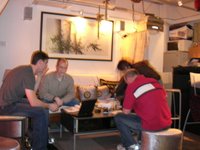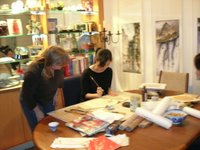Thursday, July 27, 2006
Learning through songs
I remember when I was learning English, I learned lots of Carpenters songs. I really like Yesterday Once More. For people who know me, they all know I can't sing. But that doesn't stop me learning quite a few English songs for self entertaining and for a better pronunciation. I tried some rock stuff, but that really doesn't work for me at all.
Now in my lessons, sometimes I used Deng Li Jun's songs. Her slow while clear and beautiful singing is really perfect for learning Mandarin. That's probably why her Yueliang Daibiao Wo de Xin is super popular among Mandarin learners.
Although Deng Li Jun is long gone, her beautiful voice remains.
Saturday, July 22, 2006
What to learn first?
Some people are willing to quit their jobs and take full time program, while some people take lessons after work. No matter which way you go, it's good to have some basic guidelines when you first start, and some dos and donts.
Here's the donts:
1. At the beginning, don't learn too many new structures (or grammar rules).
Learn too many new rules only make you choke and too self-concious. Know some general rules, and maximumly use them can boost confident. People tend to understand confident speakers more.
2. At the beginning, don't jump start to listen to news.
You really don't get much out of listening to news at the beginning. It's really waste of time. The experiment goes that even baby couldn't learn anything from watching TV. Listen to something approperiate. You can ditch anything contains more than 10% new vacab or new structure.
Here's the dos:
1. Learn relevant stuff.
It makes more sense if you learn "zhe tai diannao bi na tai diannao gui." (This computer is more expensive than that computer.) than "zhe gen qianbi bi na gen qianbi jian." (This pencil is sharper than that pencil.)
2. Be resourceful.
It works better if you can maximumly use what you have learned than constantly adding new vocabulary to your flash card. For example, you want to ask "how did you meet Susan?". But you don't know how to say "how". Instead, you have learned "when" and "where". So you can voice you question this way: ni zai nar renshi le Susan? ni shen me shihou renshi le Susan? (where did you meet Susan? When did you meet Susan?) You can quickly develop fluency only by being resourceful.
Wednesday, July 12, 2006
Practice with Children
They are really good pals, and will never laugh at you if you make a mistake. They will be all heartedly trying to communicate with you! Real communications, and it's fun and you get to know more about Chinese people.
Once I was at a beach in Hainan , (there are many beautiful beaches there, by the way.) and saw a family of three, dad, mum and their about 7 or 8 years old daughter, sitting there. There was a white man walking on the beach, and was passing them. And this little girl saw him and she handed a sea shell to him and ask:" ni cong nali lai a?" This white man took the shell, but didn't answer the little girl for a very obvious reason: he didn't understand her at all! So this sweet little girl kept asking the same question several times until the white man murmured something back. Eventually they had a nice little conversation using two languages. The little girl's parents sitting there, also joined the conversation. But it didn't last long, and the white man's friend came and got him away.
Next time, be prepared. If there is a sweet little Chinese girl handing you a sea shell, talk to her and practice your Mandarin!
Friday, July 07, 2006
They are not only demo lessons; they are real stuff.
That, for a complete new beginner in Chinese reading and writing field, means three to six months study.
Now time will tell if this can be truely helpful for people who take interests in Chinese characters and show them some very interesting and exciting part of being able to read and write. The real exciting part is the first two books only deal with 120 characters, however, these amazing 120 characters are extremely powerful to form passages.
It has been fun doing it. I hope people will have fun learning it!
Thursday, June 22, 2006
New Feature! - online demo lessons
These two demo lessons are available at Freebie Center.
The technology is indeed advancing fast!
Monday, May 29, 2006
Seminar: Learning Chinese Characters Using eStoke.
The first task is to get familiar with Chinese characters system and stroke orders. Then to proceed to words, sentences and paragraph will be quite easy.
With the new software eStroke, learning Chinese characters has never been easier! This software is designed for non-Chinese people. The features include:
-
Animated characters stroke order.
-
Support copy and past; drag and drop; and other Chinese input system.
-
Show Pinyin and English meaning of each character.
-
Produce speech.
-
Displaying radical stroke.
-
Pronouncing strokes name.
-
Support both simplified characters and traditional characters.
-
Control animation speed.
-
Thousands of registered users.
-
Free upgrade.
-
Free technical support.
Schedle: June 16, 2005 (Friday)
Time: 6:30pm - 7:30pm
Admission: HKD50 per person
Please register by or before June 13 at MSL Learning Center.
Monday, May 15, 2006
Summer Great Fun - Party On The Boat

It’s time to dip into the water, avoid city stress, relax yourself, and refresh yourself! Bring someone!!
Our next activity is a boat trip:
Date:
Time:
Sign up Fee: HKD 300 / person
Including:
Boat trip! Water skiing!! Speed boat!!! Banana boat!!!
Buffet Lunch and more!
Come on, seat limited, register in a hurry!!!
* We must have at least five participants.
Monday, April 24, 2006
The Freebies
Here's the link freebies.
Tuesday, April 18, 2006
Easter Weekend
Wednesday, April 12, 2006
Trip to Yunnan
 I recently spent a week in Yunnan. The first place I visited was Kunming, which is known as the "Spring City" because of its year-round warm weather. Kunming is a modern city, with a friendly and relaxed feel to it.
I recently spent a week in Yunnan. The first place I visited was Kunming, which is known as the "Spring City" because of its year-round warm weather. Kunming is a modern city, with a friendly and relaxed feel to it.My hotel in Kunming was next to a lake (the Green Lake) where the locals like to hang out on the weekends. Around the edge of the lake were cafes and bars, and various hawkers selling food and other things. It is a great place to wander around.
From Kunming, I took the train to Dali. The train trip usually takes about 7 hours. Dali is an old town surrounded by city walls. Inside, many of the traditional buildings have been converted to shops, guest houses and cafes. At night, the town is lit up with lights, giving it a festive atmosphere. The major ethnic group of the Dali region are the Baizu people, who have their own language, traditional dress and dance. They are very friendly people.



From Dali, I headed off to Lijiang (about 3 hours away by bus). Like Dali, Lijiang retains its traditional buildings. The old town is, however, much bigger than Dali and is a maze of winding streets and canals. It is very pretty.
The major ethnic group of the Lijiang area are the Naxi people. Like the Baizu people, the Naxi have their own traditional language, dress and dance, and are very friendly. In the main town square, the old people gather each day and perform dances for the tourists. At night, the town lights up with red lanterns and many of the restaurants and bars have performers singing Naxi songs and dancing Naxi dances.
There are a variety of short trips that can be done from Lijiang. These include visits to Baisha and Shuhe (both old Naxi villages), Yulong Xueshan (a nearby mountain) and Tiger Leaping Gorge. From Lijiang, it is a short 40 minute flight back to Kunming.
If you are ever contemplating a trip to Yunnan province, I would seriously recommend you go!
Learning for living
Aygul is originally from Ürümqi, the capital of the Xinjiang Province in China. Located in the middle of the Eurasian continent, Ürümqi is the most inland city in the world, located 1,400 miles from the nearest coastline.
Read more on The University of Idaho Argonaut.
Monday, March 27, 2006
A Great Night

Winning team's drawing when we were playing pictionary. Did you know what these things are?

Only these two people didn't like the movie much.

Mar 25th was such a fun night.
The only problem was that it was kind of difficult to find Gloria's bar at the first time, at least for me and Tim. But once you know where it is, it's just right there.
We watched the movie Yi Yi. It was a nice movie. You can listen to how people liked it through our podcast. We had a drink, and later on played a board game Pictionary. It was hilarious. What you see here was the drawing from the winning team, Paul, Tim and me.
It was such a great time! The plan for the future is that we will have a Mandarin night every Monday. Gloria will be your host and she is very happy to speak Mandarin with you!
Please pass around the words. Let's help each other and creat more opportunities to practice your Mandarin outside of classroom, and also meet some interesting people.
Thursday, March 23, 2006
Basic Level B Audio Lessons Now Available!
Thursday, March 16, 2006
Basic Level A audio lessons now available
If you are interested, check it out at our online catalog.
Monday, March 13, 2006
A Movie Night
Here's the details:
Date:
Time:
Venue: REN
Address: Unit C, 6/F, 8-12 Wo On Lane, Central (On the street of Ben & Jerry in LKF, next to OYSTERS. Alternatively, you can come out from the back entrance of Pacific Coffee on
 About the movie: It is a Chinese movie (of course), and has lots of good things said about it. The name is Yi Yi (one one). You can read some more about his movie here.
About the movie: It is a Chinese movie (of course), and has lots of good things said about it. The name is Yi Yi (one one). You can read some more about his movie here.See you there and enjoy the movie!
Thursday, March 09, 2006
wu wei - Taoist concept
Here's the quote:
Wu-wei, which translates literally as 'non doing'. A better translation would be more like 'effortless effort'; wu-wei describes a state in which the world seems to be working for us. We feel calm yet alert, focused yet receptive, drawing force from the storm while standing in its eye. Like the marathoner whol feels pulled forward, we accomplish the most with the minimum of energy. In this state hard work does not feel like hard labor. Nor does it feel like play. It feels a lot like the Aristotelian concept of hapiness: the full exercises of the thing we are meant to be doing.
Have you achieved wu-wei in learning Mandarin? In Chinese character wu wei is 无为.
Wednesday, March 08, 2006
Transcript of podcast
For podcast 11 - About Oscar Winner Li An, the transcript in pinyin and simplified characters is available on the online catalog at the cost of US$1. If you find it interesting and also helpful to read the transcript after you listen to the podcast, let me know.
And if you got any suggestions, do let me know. So I can do future improvement.
Monday, February 27, 2006
Learning Language Enhances (Or Motivates) Trip Abroad
"Prior knowledge does seem to help activate the brain," said Renee Jourdenais, an assistant professor in the Graduate School of Language & Educational Linguistics at the Monterey Institute of International Studies.
Of course, some languages are more difficult than others for native English-speakers to learn, because their writing and sounds differ so widely, Jourdenais said.
At the Defense Language Institute Foreign Language Center in Monterey, Calif., which is dedicated to getting U.S. diplomatic personnel up to speed before a foreign posting, basic French and Spanish courses designed to give students a modest level of proficiency last 25 weeks. Czech and Russian programs run for 47 weeks; beginner Mandarin Chinese and Arabic courses take 63 weeks.
Read the whole articel here.
Saturday, February 25, 2006
Saying 'nihao' to Mandarin
China's emergence as a world economic power has prompted the teaching of Mandarin in American schools; the Virginia-based American Council on the Teaching of Foreign Languages estimates between 30,000 and 50,000 American students are studying Mandarin.
Many of those students reside not just in cities with significant Chinese populations, but in the suburbs. Sharon, Milton, Hingham, and -- perhaps more predictably -- Quincy all offer Mandarin instruction, and Norwell may yet join them. But whether the programs continue is less certain than their success to date.
Read more in The Boston Globe.
Monday, February 20, 2006
An eye opening experience
 Last Saturday, I went to attend the Chinese calligraphy and brush painting presentation given by Li Slough. It was really an amazing experience!
Last Saturday, I went to attend the Chinese calligraphy and brush painting presentation given by Li Slough. It was really an amazing experience!Here's the artist.
She has been learning and practicing this art for almost five years. she shared with us her understaning and experience of this art and showed us her work.

She uses Chinese idioms and traditional Chinese blessings on her painting. The background paintings are all her work. Also, we had the opportunity to do a bit of bamboo leaves and brush strokes!
Li was doing demonstration.

Try!
Li Slough can be reached at 2547-7100. She loves to share her art with people and would like to meet more people who have the similar interests.








